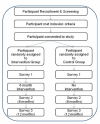The protocol of a randomized controlled trial for playgroup mothers: Reminder on Food, Relaxation, Exercise, and Support for Health (REFRESH) Program
- PMID: 21843366
- PMCID: PMC3166931
- DOI: 10.1186/1471-2458-11-648
The protocol of a randomized controlled trial for playgroup mothers: Reminder on Food, Relaxation, Exercise, and Support for Health (REFRESH) Program
Abstract
Background: Mother's physical activity levels are relatively low, while their energy consumption is generally high resulting in 58% of Australian women over the age of 18 years being overweight or obese. This study aims to confirm if a low-cost, accessible playgroup based intervention program can improve the dietary and physical activity behaviours of mothers with young children.
Methods/design: The current study is a randomized controlled trial lifestyle (nutrition and physical activity) intervention for mothers with children aged between 0 to 5 years attending playgroups in Perth, Western Australia. Nine-hundred participants will be recruited and randomly assigned to the intervention (n = 450) and control (n = 450) groups. The study is based on the Social Cognitive Theory (SCT) and the Transtheoretical Model (TTM), and the Precede-Proceed Framework incorporating goal setting, motivational interviewing, social support and self-efficacy. The six month intervention will include multiple strategies and resources to ensure the engagement and retention of participants. The main strategy is home based and will include a specially designed booklet with dietary and physical activity information, a muscle strength and flexibility exercise chart, a nutrition label reading shopping list and menu planner. The home based strategy will be supported by face-to-face dietary and physical activity workshops in the playgroup setting, posted and emailed bi-monthly newsletters, and monthly Short Message Service (SMS) reminders via mobile phones. Participants in the control group receive no intervention materials. Outcome measures will be assessed using data that will be collected at baseline, six months and 12 months from participants in the control and intervention groups.
Discussion: This trial will add to the evidence base on the recruitment, retention and the impact of community based dietary and physical activity interventions for mothers with young children.
Trial registration: Australian and New Zealand Clinical Trials Registry ACTRN12609000735257.
References
-
- National Health Survey: Summary of results, Australia 2007-2008. http://www.abs.gov.au
-
- Linne Y, Rossner S. Interrelationships between weight development and weight retention in subsequent pregnancies: the SPAWN study. Acta Obstet Gynecol Scand. 2003;82:318–325. - PubMed
Publication types
MeSH terms
Grants and funding
LinkOut - more resources
Full Text Sources
Medical


